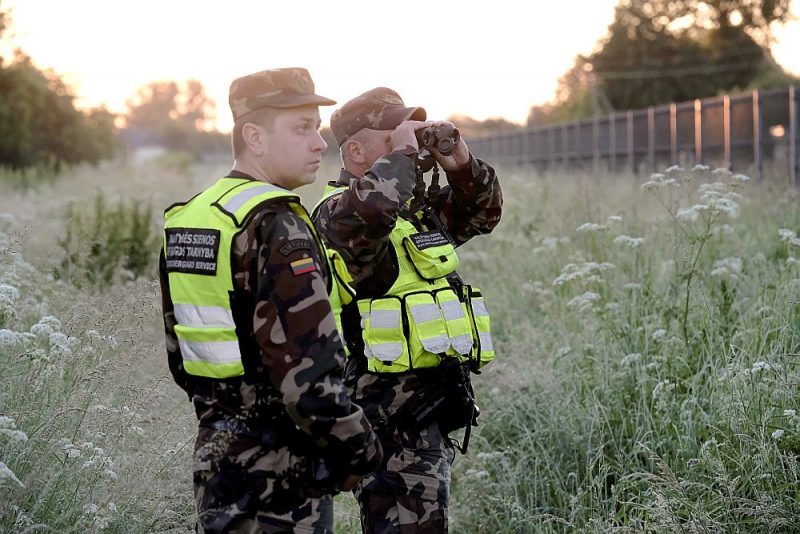
Lithuanian border guards Gintars Dicevičius and Toms Tracevičius are watching the Lithuanian-Belarusian border.
Photo: Ints Kalniņš / REUTERS / Scanpix
Valdis Bērziņš, “Latvijas Avīze”, JSC “Latvijas Mediji”
In response to the sharp increase in the flow of illegal immigrants across the Belarusian border, the Lithuanian government decided on Friday, July 2, to declare a state of emergency to facilitate decisions on logistics, funding and other issues.
–
The news
VIDEO. “Be careful!” Bricis warns about the time for the new week and reveals why there will be no predictions from him for some time
1 day
–
The news
“Slipped and hit the concrete with your head!” Kivlenieks, the goalkeeper of the Latvian hockey team, has passed away
4 hours
–
Cocktail
VIDEO. “Those screams are so supernatural! Fear of going out on the road that someone is not attacking! ”: Fashion artist David has had trouble living in the countryside
1 day
–
Prior to the government’s decision, the Lithuanian State Border Guard Service had detained a record number of illegal immigrants – 150 people – at the Belarusian border during the previous day, reports LETA / BNS.
Lithuanian officials suspect that the Belarussian regime is deliberately facilitating the flow of migrants across the border.
In order to reduce the risks of illegal immigration also on the Latvian-Belarusian border, two experts from the European Border and Coast Guard Agency “Frontex” have assisted the Latvian border guards.
Latvia has requested assistance from Frontex for the first time, and this has taken place in view of the rapid development of the situation on the Lithuanian-Belarusian border.
Lukashenko is trying to make migration a weapon of hybrid warfare
Lithuanian Foreign Minister Gabriel Landsberg has accused Belarusian dictator Alexander Lukashenko of causing a “migrant war” in an attempt to avenge Lithuania’s support for the Belarusian opposition movement and EU sanctions against the Minsk regime.
“Lukashenko is trying to make migration a weapon of hybrid warfare and weaken our commitment to sanctions,” Landsberg said on Twitter, adding: “With or without a state of emergency, he will not succeed.”
As tensions between Brussels and Minsk increase, the number of migrants entering Lithuania from Belarus has risen sharply.
The EU has said it will no longer try to curb the flow of illegal migrants and refugees to the EU as the EU imposes sanctions on the Lukashenko regime following the incident of the landing of an Irish Ryanair passenger plane at Minsk airport and the detention of opposition journalist Protasevich.
“The situation is tense and tends to worsen,” Lithuanian Foreign Minister Gabriel Landsberg said in an interview with AFP.
“The Foreign Ministry’s goal is clear: economic migrants crossing the EU border illegally must be returned to where they left off,” he said.
David Sasoli, President of the European Parliament, has expressed concern that “someone is playing with human lives unacceptably again”.
Foto: REUTERS/Scanpix/LETA
The Minsk regime is deliberately increasing the flow of migrants
According to Lithuanian officials, the Belarussian regime is deliberately increasing the flow of migrants, helping them to reach the border between the two countries. On July 2, Lithuanian border guards detained 150 migrants from Belarus, almost twice as many as in 2020.
By the beginning of July this year, more than 800 violators have been detained on the 680-kilometer-long Lithuanian-Belarusian border. To help Vilnius cope with the flow of migrants directed by Minsk, the first six border guards from the EU border guard agency Frontex have arrived in Lithuania.
French, Hungarian and German border guards will take part in patrols in Druskininkai and Kapčamieste stations led by Lithuanian border guards.
These representatives of the Frontex Permanent Corps are expected to be joined by others and will be patrolled by Lithuanian border guards from mid-July by 30 EU border guards who will arrive with their own vehicles, weapons and equipment.
Two weeks ago, Lithuanian army soldiers set up tents to accommodate the growing number of migrants and refugees, most of whom came from the Middle East.
Some of the migrants are Syrian citizens who would like to join their relatives who have already been granted refugee status in an EU country. Migrants include Africans from Cameroon and Mali, as well as migrants from Iraq, Iran, Turkey and Russia. A Lithuanian border guard spokesman said most of the migrants had previously arrived at Minsk airport on direct flights from Istanbul and Baghdad.
“Their further movement from Minsk to the Lithuanian border, where they were detained, is known to the Lithuanian intelligence service,” he said.
Lukashenko has ordered the complete closure of the border with Ukraine, as a huge amount of weapons arrived in Belarus from Ukraine.
He also said that “dormant terrorist cells or so-called self-defense units” had been discovered in Belarus, aimed at “a violent change of power on Day X”. The dictator added that Germany, Ukraine, the USA, Poland and Lithuania were associated with these cells.
Municipalities are involved in solving the border situation
According to Lithuanian Interior Minister Agne Bilotaite, who has been appointed Head of Emergency Operations, this decision was taken not because the level of threat had increased, but because it was easier to make decisions on logistics, funding and other issues in border control.
Prime Minister Ingrīda Šimonīte said that one of the goals is to involve local governments in solving the border situation. According to her, one of the biggest problems is related to the pandemic situation and the need to quarantine foreigners in Lithuania.
“This means that more resources will be needed than would be needed in another situation,” the head of government emphasized. In total, 822 illegal immigrants have tried to enter Lithuania across the Belarusian border since the beginning of the year – ten times more than in the whole of last year.
Some migrants do not have any documents. All detainees are tested for Covid-19 and will remain in isolation until results are available.
As the flow of illegal immigrants from Belarus has increased, the Lithuanian Border Guard has reorganized its forces by seconding border guards from other units. Forces of the Public Security Service, the Riflemen’s Union and other organizations have also assisted the Border Guard.
Themes
–


